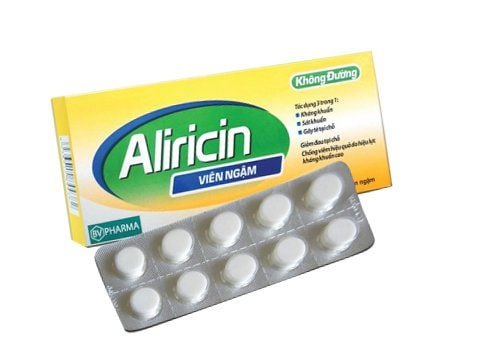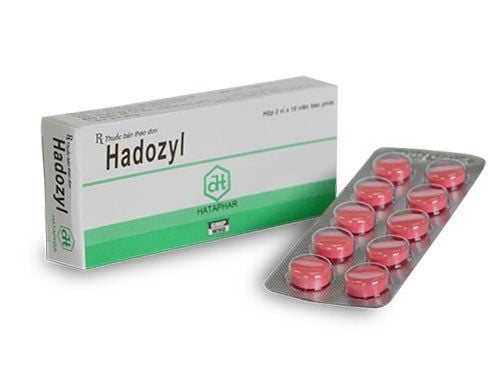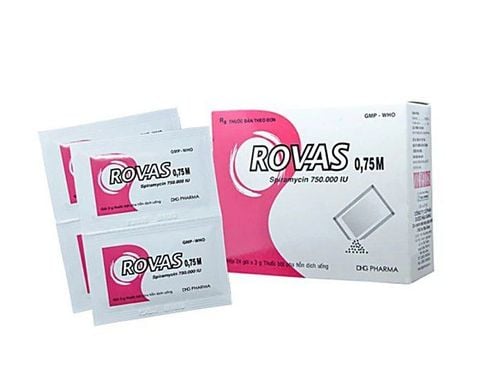This is an automatically translated article.
Zokora drug has main ingredients including Spiramycin and Metronidazol. Zokora is used in the treatment of dental infections and prevention of dental infections after surgery. Understanding general information such as composition, indications, contraindications, dosage and side effects of Zokora will help patients and their families improve treatment results.
1. What is Zokora?
Zokora drug is prepared in the form of film-coated tablets, with the main ingredients including:
Active ingredient: Spiramycin 1.5 mIU. Metronidazole 250 mg. Excipients: Croscarmellose sodium, Magnesium stearate, Microcrystalline Cellulose, Hydroxypropylmethylcellulose, Talc powder, Polyethylene glycol 6000, Titanium dioxide, Quinolin color, Ponceau 4R color just enough for 1 film-coated tablet. Spiramycin is an antibiotic belonging to the Macrolide group, with a mechanism of action on the 50S ribosomal subunit of bacteria and prevents bacteria from synthesizing proteins. Since then, Spiramycin has a bacteriostatic effect on dividing cells at serum concentrations, and at the same time has a bactericidal effect when reaching concentrations in tissues. Spiramycin has strong antibacterial activity against bacteria that cause oral diseases such as: Pneumococcal, meningococcal, non-D streptococci, Corynebacterium, Chlamydia, Bordetella pertussis, Actinomyces, Mycoplasma. Insensitive to bacteria such as gonococcal bacteria, Streptococcus D, staphylococcus, Haemophilus influenzae and resistant to Gram-negative aerobic bacilli. Metronidazol is an antibiotic belonging to the Nitro 5 Imidazole group, after being absorbed into the body, it will be reduced by ferredoxin or by Electron transport proteins to form cytotoxic intermediates. The reducing active ingredients of Metronidazol will bind to the structure of bacterial DNA, lose the helix structure of the DNA molecule, thereby killing bacteria and single-celled microorganisms. Metronidazole has antibacterial activity against bacteria that cause oral diseases such as: obligate anaerobes, Bifidobacterium bifidum, Clostridium, C. perfringens, Melaninogenicus, Pneumosintes, Fusobacterium, Eubacterium, Bacteroides fragilis, Veillonella, Peptostreptococcus, Peptococcus. Insensitive to bacteria such as Propionibacterium Acnes, Actinomyces, Arachnia and resistant to facultative anaerobes and aerobic bacilli.
2. What does Zokora do?
Zokora medicine is indicated for the treatment of the following cases:
Acute, chronic and recurrent oral infections in dental abscesses, cellulitis around the jawbone, inflammation, inflammation around the roots, stomatitis, gingivitis, periodontitis, stomatitis, parotid gland inflammation, submandibular inflammation. Prevention of infection after oral surgery. However, in the following cases, the drug Zokora is not allowed to prescribe:
Hypersensitivity to any ingredient of the drug Zokora. History of allergy to other drugs containing the active ingredients Spiramycin or Metronidazol. History of allergy to macrolide antibiotics or Nitro 5 Imidazole. Children under 6 years old. Women who are pregnant in the first 3 months of pregnancy or women who are breastfeeding.
3. Dosage and how to use Zokora
Dosage
Adults
Usual dose: Take 1 tablet/time x 2-3 times/day. Attack dose: Take 2 tablets x 2 times/day in patients with severe infections, then maintain at the usual dose. Children
Children 15 - 18 years old: Take 1 tablet/time x 2-3 times/day. Children 10 - 15 years old: Take 1⁄2 tablets/time x 3 times/day. Children 6-15 years old: Take 1⁄2 tablets/time x 2 times/day. Children < 6 years old: Zokora is not recommended. Note: Use Zokora with meals.
4. Side effects encountered when using Zokora
The use of Zokora in high doses or for a long time, can cause side effects such as:
Digestive disorders: Nausea, vomiting, stomach pain, diarrhea or constipation. Allergic reactions: Angioedema, urticaria, itching, redness, severe may lead to anaphylaxis. Neurological: Headache, dizziness, loss of coordination, ataxia, paresthesia, motor and sensory polyneuritis. Other: Glossitis, metallic taste in mouth, stomatitis, leukopenia, red-brown urine. The drug should be stopped when detecting the above undesirable side effects or other unusual symptoms after using Zokora, and promptly inform the treating doctor about the use of Zokora or go to the medical facility immediately. nearest hospital for prompt treatment.
5. Note the use of Zokora in the following subjects
Note to use Zokora drug in the following cases:
Use caution when using Zokora in patients with a history of or are suffering from mental disorders, central or peripheral neuropathy, blood diseases especially related to white blood cells. Avoid using Zokora in children under 6 years of age because the safety studies are still limited. Pregnancy: There are limited data on the adverse effects of spiramycin contained in Zokora in pregnant women. At the same time, according to the classification of the US Food and Drug Administration (FDA), the active ingredient Metronidazol belongs to group C, the group with evidence of the risk of harm to the fetus, especially in the first 3 months of pregnancy. Therefore, the use of Zokora is contraindicated during pregnancy. Lactation: Some studies indicate that both Spiramycin and Metronidazol can pass into breast milk. Therefore, breast-feeding should be discontinued when deciding to use Zokora. Drivers or machine operators often experience side effects such as headache, dizziness, loss of coordination, ataxia ... after taking Zokora.
6. Zokora drug interactions
Concerning Spiramycin
Use caution when using Zokora with Levodopa. Related to Metronidazol
Zokora drug increases blood levels of Lithium drug. Avoid using Zokora with oral anticoagulants such as Warfarin, as there may be an increased risk of bleeding due to increased anticoagulant effects. Zokora increases the effect of Vecuronium. Zokora increases the kinetics of 5 Fluorouracil by reducing clearance. Above is basic information about ingredients, indications, contraindications, dosage and notes when using Zokora. Patients and relatives should carefully read the instructions for use of Zokora medicine and strictly follow the instructions of the treating doctor to get the best treatment effect.
Follow Vinmec International General Hospital website to get more health, nutrition and beauty information to protect the health of yourself and your loved ones in your family.













